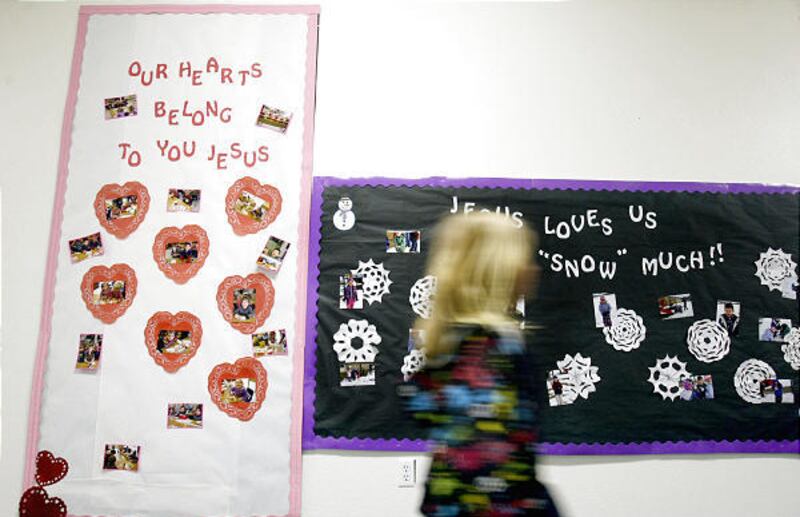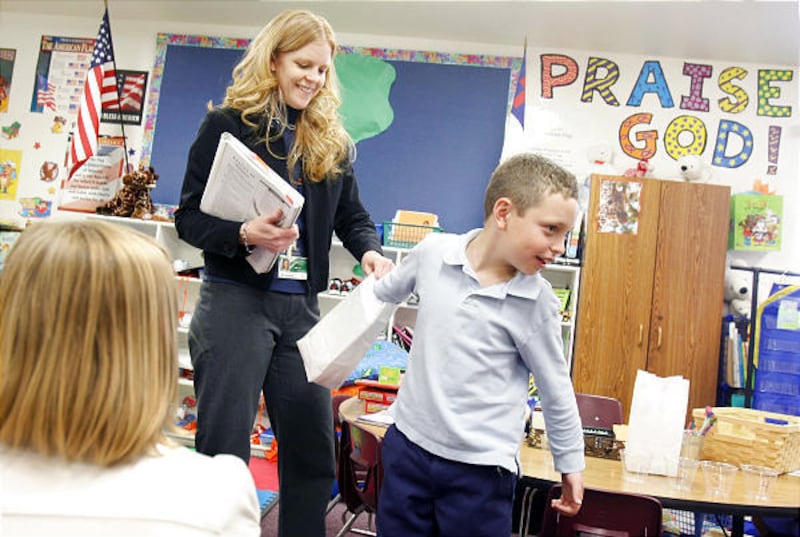RIVERDALE — Shari Mabbit smiles, moving her dry-erase marker in big, bold strokes as she spells out vocabulary words for her class at Christian Heritage School. It's easy to tell, however, watching her move through the room checking the second-graders' carefully penned lists, that the teacher is grieving inside.
In a few months, because of financial problems, the private elementary school Mabbit loves will be no more.
"It breaks my heart," she said, but she and her colleagues haven't lost faith.
Christian Heritage School plans to rent its Riverdale elementary building to Good Foundations Academy, a public charter school that, minus references to Jesus, touts a similar value set and a near-identical curriculum. Many of the soon-to-be-laid-off teachers have already applied for jobs with the charter. Parents, eager for a shot at a squeaky-clean, tuition-free education, have started lining up for the enrollment lottery.
"It isn't ideal, but it's still a miracle," said Christian Heritage headmaster Steve Deihl. "God found a way to keep the spirit (of the school) alive."
Administrators on both sides of the deal call the set up, which leaves Christian Heritage with enough cash to continue offering high school classes, "a match made in heaven." Critics, though, draw disturbing similarities between the schools' plans and a nationwide trend toward "character-focused" charter schools that use taxpayer money to promote parochial views.
In the past three years, more than 1,000 failed Christian schools across the country have reopened as public charters. The new schools, most of which hire the same teachers and serve the same students, deny preaching religion during class but still place heavy emphasis on Bible-based values. Some charters, like Nampa Classical Academy in Idaho, have even made attempts at substituting scriptures for textbooks.
While many experts argue teaching virtue alongside reading and math increases academic performance, others worry that, with little state oversight, charter-school staff can't be trusted to keep discussions nondenominational.
A prayer answered
Both Deihl and Tom Koehler, head of the Good Foundations Academy, regard each other as answers to prayer.
"They needed money, and I needed a building," said Koehler, who learned about the private school's predicament through his church. "I couldn't have planned it better."
The two schools didn't start out on such friendly terms, however.
Christian Heritage, which is operating $300,000 in the red, blames its financial problems on Ogden-area charter schools like NUAMES and Quest. In a downward spiraling economy, it was difficult for many parents to come up with $4,000 for private school tuition. Charter schools, with their small class sizes, sharp uniforms and strict conduct codes, seemed like the next best thing.
When Jana Whitby, an Ogden mother of two, had to take her children out of Christian Heritage last year because of money problems, she didn't even consider the local public school. She'd been there, she said. "It's like a crazy mass of misbehaving kids."
Private-school parents, like Whitby, report feeling "more comfortable" in charter schools, though, because many are founded by community members who champion typical Christian morals. Several Utah charter schools, including American Leadership Academy in Salt lake City and C.S. Lewis Academy in Santaquin, have made it their mission to reintroduce value-based learning into what many parents see as a permissive public school system.
Whitby describes her children's new charter school as her "saving grace."
She doesn't worry about drugs, sex, cheating or stealing. Plus, she noted, the principal at Ogden Preparatory Academy formerly headed Christian Heritage.
"I don't think my kids even know they left Christian school," she said.
"The charter doesn't teach the Bible directly, but they have outstanding values."
Ironically, it is for the same reasons charters like Good Foundations Academy ruined Christian Heritage that Deihl reached out to Koehler for help. His charter is especially appealing, administrators said, because a pastor leads the founding board.
"It is sad to see the end of the elementary program at Christian Heritage," said Lisa Erwin, the school's principal. "It's been a grieving process. But, at the same time, I believe God has a plan for Good Foundations."
Character education
While Christian Heritage boasts formidable test scores, when Erwin talks about her students, she's most proud of the way they treat the people around them.
"We're really a family here," she said. "We all love God and all love each other."
Good Foundations Academy has a similar focus.
The K-6 charter school, which is set to open this fall, is built around seven "foundation stones:" respect, cooperation, citizenship, integrity, perseverance, self-control and responsibility. Like many Utah schools, which release students for an hour each day to study religion at an off-campus seminary, Good Foundations Academy will offer students the option to take Bible classes at an institute across the parking lot.
Seven-year-old Cody Baker buys into value-based education because he was bullied at his public school. Once he switched to Christian Heritage, he said, he wasn't afraid to go to school anymore.
"I like that they teach us how to be good," said the second-grader. "My new school (Good Foundations Academy) will do that, too. We just have to go to a different building to talk about Jesus."
The Colorado school Koehler used as a model for his charter, Liberty Common Charter School, is considered one of the best in its state. In 2008, 93 percent of students scored proficient on standardized tests, compared to a state average of 62. Koehler contributes a good share of the school's success to its emphasis of values.
Experts agree.
Students at schools with strong character-education programs score higher on standardized tests, according to a 2003 study of 681 California schools. The more explicit the discussions of ethics, researchers found, the better the grades.
"Over the years, values have been shown to be an important part of effective schooling," said Michael Shreve, a research and education fellow for the Character Education Partnership, a Washington D.C. non-profit that works with schools across the nation. "Not only does it increase academic performance, but it also decreases bullying and helps to close the achievement gap."
As a state, Utah supports character education. Schools are required by law to provide students with some sort of ethical guidance. While Davis School District gives elementary-age children one 30-minute lesson a week, many charter school leaders believe virtue should be an everyday topic of discussion. At Good Foundations Academy, like Christian Heritage before it, teachers will work discussions of integrity and self-control into math, science and reading.
"I think teaching in the public school system as we know it today is like trying to teach in a moral vacuum," Koehler said. "We are so worried about imposing opinions on people that we forget teaching character is a vital part of molding good children."
Church and state
Even character education supporters point out, however, that teaching values in school without stepping over constitutional lines can be tricky.
"One of the problems with the character-education movement is how easy it is for faith to sneak into the classroom," Shreve said. "Schools have to make sure they are teaching generally accepted community values and not pushing religion."
While Koehler vehemently denies intentions to "indoctrinate public-school kids," he admits his day job as pastor for Christ Community Church played a large part in his decision to delve into education. He picked most of his school-board members from his congregation.
"As a church, we really want to find creative ways to serve the community," he said. "What better way to impact the community than to influence children through quality education?"
At first, the State Charter School Board, which screens new charters before the Legislature doles out funding, questioned the depth of Christ Community Church's involvement in Good Foundations Academy. Early on in the planning process, Koehler's original plan to use church property to house the school was axed. Advocates of church-state separation, though, find the charter's new plan to use Christian Heritage's facility and teachers equally unsettling.
"It's not hard for teachers who are in the same place, doing the same thing, to slip up and revert back to talking religion," said Barry Lynn, executive director of Americans United for Separation of Church and State, a Washington, D.C., nonprofit. "The difficulty is figuring out who is going to monitor all of the activities to make sure these so-called public schools are abiding by public rules."
The State Office of Education has delegated only five employees to watch over Utah's 72 charter schools. While the state monitors student enrollment, finances and academic performance, it does not have any checks and balances in place to make sure charters aren't preaching religion. State employees do not take time to observe classroom teachers.
The state has gotten some complaints about the issue, said Brian Allen, chair of the State Charter School Board. One school was caught posting scriptures on its Web site. Another tried to rent out two classrooms to The Church of Jesus Christ of Latter-day Saints for daytime seminary. The State Charter School Board launched a monthslong investigation after parents accused Beehive Science & Technology Academy of pushing Islam.
"People are well-intended, but they're not always well-versed in law," he said. "Sometimes they mess up."
Even so, Allen said he is now confident Good Foundations Academy will limit its religious instruction to the Bible Institute across the parking lot. Christian Heritage is on board with that plan, too.
"It makes me sad to take Christ out of my lesson plans, but I recognize the necessity," Mabbit said. "What's important is that kids still learn good standards. Good quality character carries over into every aspect of life."
e-mail: estuart@desnews.com



